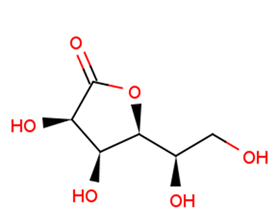
D-Gulonic acid γ-lactone
CAS No. 6322-07-2
D-Gulonic acid γ-lactone ( —— )
产品货号. M19650 CAS No. 6322-07-2
L-古洛糖酸内酯(也称为还原型抗坏血酸,RAA)是 L-古洛糖酸-1,4-内酯氧化还原酶 (EC 1.1.3.8) 的底物,它催化 L-抗坏血酸生物合成的最后一步 (维生素C)存在于植物和动物中。
纯度: >98% (HPLC)
 COA
COA
 Datasheet
Datasheet
 HNMR
HNMR
 HPLC
HPLC
 MSDS
MSDS
 Handing Instructions
Handing Instructions
| 规格 | 价格/人民币 | 库存 | 数量 |
| 1G | ¥332 | 有现货 |


|
生物学信息
-
产品名称D-Gulonic acid γ-lactone
-
注意事项本公司产品仅用于科研实验,不得用于人体或动物的临床与诊断
-
产品简述L-古洛糖酸内酯(也称为还原型抗坏血酸,RAA)是 L-古洛糖酸-1,4-内酯氧化还原酶 (EC 1.1.3.8) 的底物,它催化 L-抗坏血酸生物合成的最后一步 (维生素C)存在于植物和动物中。
-
产品描述L-Gulonolactone (also known as reduced ascorbic acid RAA) is the substrate of the enzyme L-gulono-14-lactone oxidoreductase (EC 1.1.3.8) which catalyzes the last step of the biosynthesis of L-ascorbic acid (vitamin C) in plants and animals. The enzyme L-Gulono-14-lactone oxidase is missing in scurvy-prone vitamin C-deficient animals such as humans. L-Gulonolactone is present in human blood and has been used as one of the markers to compare changes in exercise-induced oxidative stress. (PMID: 16956367 16494601 ).
-
体外实验——
-
体内实验——
-
同义词——
-
通路Others
-
靶点Other Targets
-
受体Others
-
研究领域——
-
适应症——
化学信息
-
CAS Number6322-07-2
-
分子量178.14
-
分子式C6H10O6
-
纯度>98% (HPLC)
-
溶解度DMSO:10 mM
-
SMILESOC[C@@H](O)[C@@H]1OC(=O)[C@H](O)[C@@H]1O
-
化学全称——
运输与储存
-
储存条件(-20℃)
-
运输条件With Ice Pack
-
稳定性≥ 2 years
参考文献
1.Wolucka B A Communi D . Mycobacterium tuberculosis possesses a functional enzyme for the synthesis of vitamin C L-gulono-14-lactone dehydrogenase[J]. Febs Journal 2006 273(19):4435-4445.
产品手册




关联产品
-
cis-3-Hexen-1-ol
Cis-3-Hexen-1-ol(叶醇)是一种芳香化合物,通常被描述为“青草味”或“割下的草”的气味。
-
Big Endothelin-1 (hu...
Big Endothelin-1 (human)
-
Gomisin H
Gomisin H is a natural product from Schizandra chinensis.



 021-51111890
021-51111890 购物车()
购物车()
 sales@molnova.cn
sales@molnova.cn







